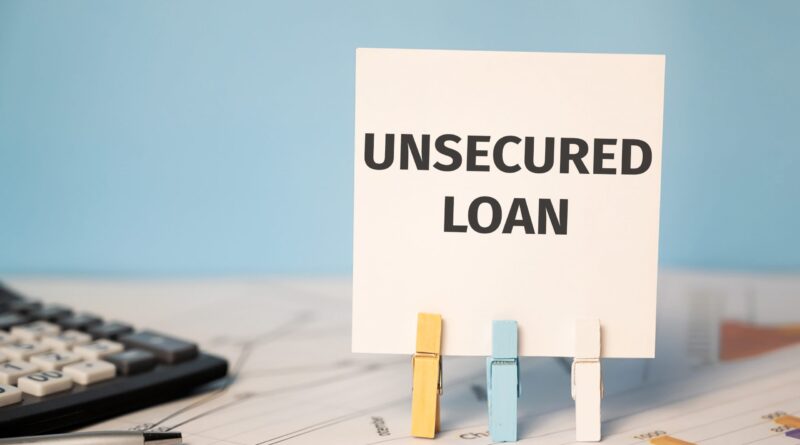The Complete Guide to Unsecured Commercial Loans: What You Need to Know
In the world of business financing, understanding the options available can significantly impact your company’s success. Unsecured commercial loans are a vital source of funding for businesses looking to expand, cover operational costs, or invest in new projects without the need for collateral. In this comprehensive guide, we’ll explore what unsecured commercial loans are, the types available, their advantages and disadvantages, eligibility criteria, application processes, real-world case studies, and more.
Understanding Unsecured Commercial Loans
Unsecured commercial loans are financing options provided to businesses without the requirement of collateral. Unlike secured loans, which involve pledging assets (like real estate or equipment) as a guarantee against default, unsecured loans rely primarily on the creditworthiness of the borrower. This means that if a business cannot repay the loan, the lender cannot claim specific assets to recover their funds, although they can take legal action to recover the debt.
Why Choose Unsecured Loans?
Businesses often opt for unsecured loans due to the following reasons:
No Collateral Required: This allows businesses without significant assets to secure financing.
Quick Approval Process: Unsecured loans typically have a faster application and funding process compared to secured loans.
Flexibility of Use: Funds from unsecured loans can be used for a variety of business purposes, from managing cash flow to financing a new project.
Types of Unsecured Commercial Loans
Understanding the different types of unsecured commercial loans is crucial for choosing the right one for your business needs.
Business Lines of Credit
A business line of credit is a flexible loan option that allows borrowers to draw funds as needed, up to a predetermined limit. Interest is only paid on the amount drawn, making it ideal for businesses with fluctuating cash flow or those needing quick access to funds.
Key Features:
Revolving credit line
Interest paid only on borrowed amounts
Suitable for short-term expenses
Unsecured Term Loans
Unsecured term loans provide a lump sum of money that must be repaid over a set period with fixed monthly payments. These loans are typically used for larger purchases or investments, such as expanding facilities or acquiring new equipment.
Key Features:
Fixed loan amounts and terms
Predictable repayment schedule
Suitable for significant business expenditures
Merchant Cash Advances
A merchant cash advance is a funding option based on the credit card sales of a business. The lender provides a lump sum in exchange for a percentage of future sales, making it a viable option for businesses with high credit card transactions.
Key Features:
Quick access to funds
Flexible repayment tied to sales
Perfect for companies with high credit card sales
Equipment Financing Without Collateral
While traditional equipment financing often requires collateral, some lenders offer unsecured options for purchasing necessary equipment. These loans allow businesses to acquire machinery or technology without securing against existing assets.
Key Features:
No collateral needed
Helps businesses maintain cash flow
Enables investment in essential equipment
Advantages of Unsecured Commercial Loans
Unsecured commercial loans come with various benefits that make them an attractive option for businesses.
No Collateral Required
One of the most significant advantages of unsecured loans is that borrowers do not need to put up assets as collateral. This reduces the risk for businesses, especially startups or those without significant physical assets.
Quick Approval and Funding Process
Unsecured loans often have a streamlined application process, enabling businesses to receive funds quickly. This speed can be crucial for seizing time-sensitive opportunities or addressing immediate financial needs.
Flexibility in Use of Funds
Borrowers have the freedom to use unsecured loan funds for various business purposes, such as managing day-to-day expenses, expanding operations, or investing in marketing initiatives.
Disadvantages and Risks of Unsecured Commercial Loans
Despite their advantages, unsecured commercial loans also come with certain drawbacks and risks.
Higher Interest Rates
Compared to secured loans, unsecured loans usually have higher interest rates since they represent a greater risk to lenders. This can lead to increased repayment amounts and may impact a business’s overall profitability.
Shorter Repayment Terms
Unsecured loans often have shorter repayment periods, which can place additional strain on a business’s cash flow. Borrowers must be prepared for more frequent payments and a tighter timeline for repayment.
Stricter Credit Requirements
To mitigate risk, lenders may impose strict credit requirements for unsecured loans. Businesses with lower credit scores may find it challenging to qualify or may face unfavorable loan terms.
Eligibility Criteria for Unsecured Commercial Loans
Qualifying for an unsecured commercial loan involves meeting certain criteria that lenders assess during the application process.
Credit Score Requirements
Most lenders require a minimum credit score of 680 to qualify for an unsecured loan. A strong credit history demonstrates a business’s ability to manage debt responsibly, which can lead to better loan terms.
Business Revenue and Cash Flow
Lenders typically evaluate a business’s revenue and cash flow to ensure it can meet repayment obligations. Businesses should prepare financial statements, including profit and loss statements, to showcase their financial health.
Time in Business
Lenders often prefer businesses that have been operational for at least one to two years. A proven track record of success can increase the chances of loan approval.
How to Apply for Unsecured Commercial Loans
Securing an unsecured commercial loan requires careful preparation and understanding of the application process.
Preparing Your Application
Before applying, businesses should gather the necessary documentation, including:
Business plan outlining goals and funding needs
Financial statements demonstrating revenue and cash flow
Personal and business credit history
Choosing the Right Lender
Researching and selecting a lender is crucial for finding favorable terms. Consider factors such as:
Interest rates and fees
Loan terms and repayment schedules
Customer service and support
The Application Process Explained
Once the necessary documentation is prepared, businesses can submit their application. The lender will review the application, conduct a credit check, and may request additional information before making a decision. Upon approval, funds can be disbursed relatively quickly.
Real-World Examples: Unsecured Loan Success Stories
Case Study 1: A Startup’s Journey to Secure an Unsecured Loan
Business Background: A tech startup developed an innovative app but needed additional funds to enhance its features and market its product.
Loan Details: The startup secured an unsecured term loan of $50,000.
Outcome: The funds allowed the startup to hire developers and implement marketing strategies, resulting in a successful launch and strong initial user engagement. Within a year, the business generated enough revenue to pay off the loan and reinvest in further development.
Case Study 2: Established Business Using an Unsecured Line of Credit
Business Background: A local retail store faced fluctuations in sales and required immediate access to funds for inventory replenishment.
Loan Details: The business established a $30,000 unsecured line of credit.
Outcome: With the line of credit, the retailer managed to maintain a steady inventory flow, keeping the shelves stocked during peak seasons. The flexibility allowed them to adapt quickly to market demands, resulting in increased sales and improved cash flow.
Frequently Asked Questions (FAQs)
How do secured and unsecured loans differ from one another?
Secured loans require collateral, while unsecured loans do not. This means that in the case of default, secured loans allow lenders to seize specific assets, whereas unsecured loans rely solely on the borrower’s creditworthiness.
How quickly can I get an unsecured commercial loan?
The timeline for approval and funding varies by lender but typically ranges from a few days to a few weeks, depending on the application process and documentation required.
Are there any alternatives to unsecured loans?
Yes, alternatives include secured loans, government-backed loans, crowdfunding, and personal loans. Each option has its pros and cons, so it’s essential to evaluate what fits your business needs best.
Contact Us for Your Unsecured Commercial Loan Needs
At Commercial Lending USA, we specialize in providing tailored financing solutions for businesses seeking unsecured commercial loans. Our team of experienced professionals is here to help guide you through the process and find the right financing option for your needs.
Website: commerciallendingusa.com
Phone: (855) 365-9200
Email: sales@commerciallendingusa.com




